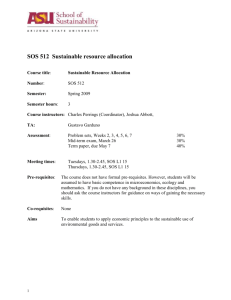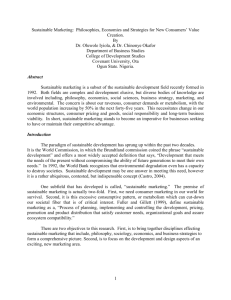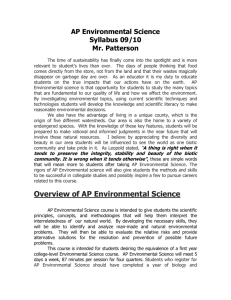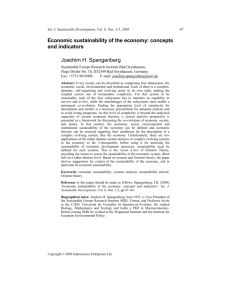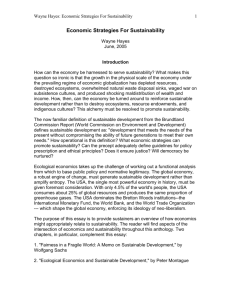Complexity Economics for Sustainability
advertisement
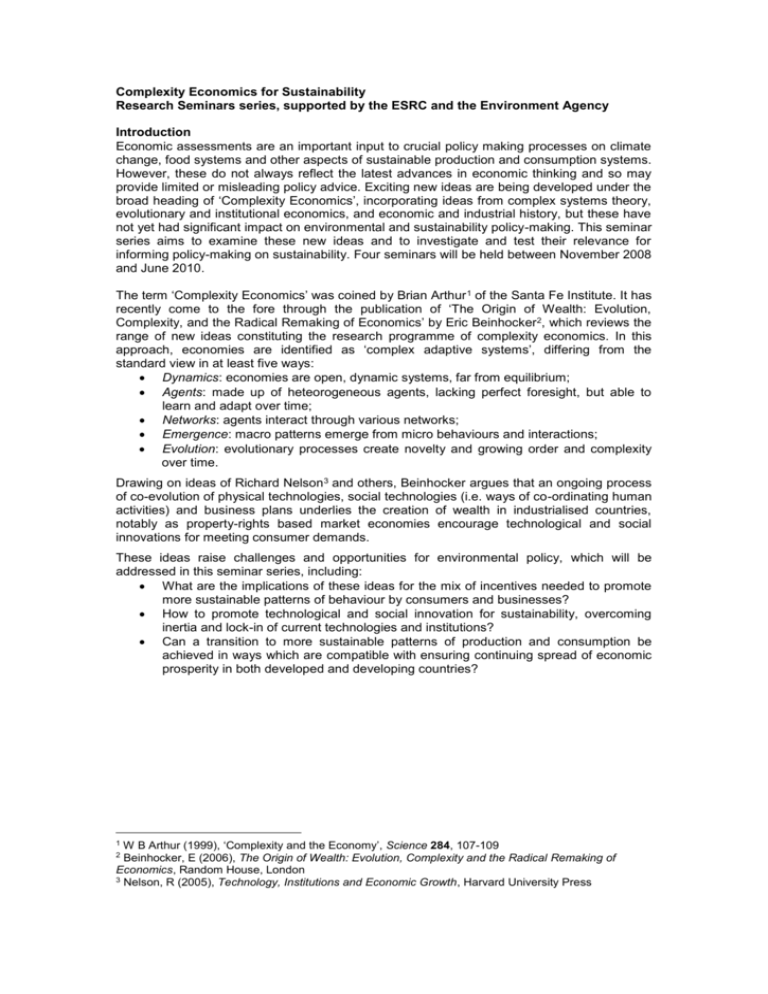
Complexity Economics for Sustainability Research Seminars series, supported by the ESRC and the Environment Agency Introduction Economic assessments are an important input to crucial policy making processes on climate change, food systems and other aspects of sustainable production and consumption systems. However, these do not always reflect the latest advances in economic thinking and so may provide limited or misleading policy advice. Exciting new ideas are being developed under the broad heading of ‘Complexity Economics’, incorporating ideas from complex systems theory, evolutionary and institutional economics, and economic and industrial history, but these have not yet had significant impact on environmental and sustainability policy-making. This seminar series aims to examine these new ideas and to investigate and test their relevance for informing policy-making on sustainability. Four seminars will be held between November 2008 and June 2010. The term ‘Complexity Economics’ was coined by Brian Arthur 1 of the Santa Fe Institute. It has recently come to the fore through the publication of ‘The Origin of Wealth: Evolution, Complexity, and the Radical Remaking of Economics’ by Eric Beinhocker2, which reviews the range of new ideas constituting the research programme of complexity economics. In this approach, economies are identified as ‘complex adaptive systems’, differing from the standard view in at least five ways: Dynamics: economies are open, dynamic systems, far from equilibrium; Agents: made up of heteorogeneous agents, lacking perfect foresight, but able to learn and adapt over time; Networks: agents interact through various networks; Emergence: macro patterns emerge from micro behaviours and interactions; Evolution: evolutionary processes create novelty and growing order and complexity over time. Drawing on ideas of Richard Nelson 3 and others, Beinhocker argues that an ongoing process of co-evolution of physical technologies, social technologies (i.e. ways of co-ordinating human activities) and business plans underlies the creation of wealth in industrialised countries, notably as property-rights based market economies encourage technological and social innovations for meeting consumer demands. These ideas raise challenges and opportunities for environmental policy, which will be addressed in this seminar series, including: What are the implications of these ideas for the mix of incentives needed to promote more sustainable patterns of behaviour by consumers and businesses? How to promote technological and social innovation for sustainability, overcoming inertia and lock-in of current technologies and institutions? Can a transition to more sustainable patterns of production and consumption be achieved in ways which are compatible with ensuring continuing spread of economic prosperity in both developed and developing countries? W B Arthur (1999), ‘Complexity and the Economy’, Science 284, 107-109 Beinhocker, E (2006), The Origin of Wealth: Evolution, Complexity and the Radical Remaking of Economics, Random House, London 3 Nelson, R (2005), Technology, Institutions and Economic Growth, Harvard University Press 1 2 Seminar 1: University of Oxford, 27-28 November 2008 Department for Continuing Education Rewley House, 1 Wellington Square, Oxford OX1 2JA http://www.conted.ox.ac.uk/about_us/contact.php Thursday 27th November Public Lecture Eric Beinhocker, ‘Escaping the Last Malthusian Trap: Complex systems, climate change and economic growth’ Friday 28th November Session 1 – Complexity and evolutionary approaches Dr Koen Frenken (University of Utrecht) and Albert Faber (Netherlands Environmental Assessment Agency), ‘Complexity, evolutionary economics and environmental policy’ Dr Felix Reed-Tsochas (University of Oxford), ‘Sustainability under pressure: modelling robust strategies for shrinking organisational networks’ Discussant: Henry Leveson-Gower (GHK International) Session 2 – Dynamic strategies for sustainability Prof Andy Stirling (SPRU, University of Sussex), ‘Durability, stability, resilience and robustness: Dynamic strategies for sustainability’ Dr Tim Foxon (University of Leeds), ‘Co-evolution of technologies, institutions and business strategies for a low carbon future’ Discussant: Prof Christine Oughton (University of Bolzano) Session 3 – Developing economic thinking for sustainability Dr Terry Barker (University of Cambridge), ‘The global deal: treating anthropogenic climate change as an economic internality’ Discussant: Prashant Vaze (Independent researcher) Wrap up Session Ronan Palmer (Environment Agency), ‘Opportunities and challenges’ Summary of Seminar 1 Contacts: Dr Tim Foxon, University of Leeds, t.j.foxon@leeds.ac.uk Prof. Jonathan Michie, University of Oxford, jonathan.michie@conted.ox.ac.uk









